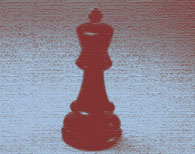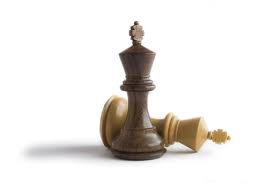Total Chess: More Ways to Draw

There are three more ways to draw, but they do not happen very often.
They are more common with advanced players than with beginners, and they are more difficult to recognize and harder to decide.
1) Fifty move rule: If at any time during a game there are fifty consecutive moves made without a capture or a pawn move, then either player can claim a draw. This means fifty moves by both players, not twenty-five moves by one player and twenty-five moves by the other player, but fifty complete moves. A complete move is one move by each player.
Usually it is the player who is behind in material that will want to claim a draw by the fifty move rule. When you are recording the game with scorekeeping, you simply look at your scoresheet to see if you can use the fifty move rule. If there are fifty moves made without a capture or a pawn move, then you can claim a draw. You tell the opponent that you are using the fifty move rule, and then you show him your score sheet to prove it. You have a written record of the game.
What if you are not recording the game with scorekeeping? How do you count fifty moves and how do you prove it? Then the player who is behind and who wants to claim a draw by the fifty move rule must do the counting. You tell the opponent that you are using the fifty move rule to claim a draw, and then you start counting aloud after each move is made. You make your first move and you say, “one.” The opponent makes his move, then you make your next move and you say, “two.” If there is a capture or a pawn move, then you must start over again from one. If you count to fifty without any captures or pawn moves, then you can claim a draw by the fifty move rule. The opponent, if he wants to avoid the fifty move rule, must make a capture or a pawn move within fifty moves.
2) Repetition: If at any time during a game the same exact board position occurs three times, and it is the same player’s turn to move each time, then either player can claim a draw. You almost certainly will need a score sheet to prove this, unless it is a simple case of both players moving the same piece back and forth three times.
Usually, the player who is behind in material will want to claim a draw by repetition. If the opponent does not agree that there has been a repetition of the same position three times, then you will have to use your score sheet to replay the game and prove it. If you are not using a scoresheet then you must rely on the fairness and good sportsmanship of the opponent to make your claim. You should always be fair and honest in your decision of whether or not there has been a draw by repetition.
3) Perpetual check: If at any time during a game it becomes clear that one player can keep putting the other player in check forever, and he intends to do so, then he can claim a draw by perpetual check. This is more difficult to determine than the previous two draws, and may in fact transpose into one of them at some point. Typically, if there is no place for the king to hide to avoid check, then a draw by perpetual check can be claimed. The other player may stop the perpetual check if he can find a way to avoid being put into check.
Usually, the player who is behind in material will want to claim a draw by perpetual check. Or, one player may be facing an unstoppable checkmate threat. The only way to avoid being checkmated and losing the game may be to make a draw by perpetual check.
***
From the book, “TOTAL CHESS: Learn, Teach and Play the Easy 1-2-3 Way,” by John Herron
TOTAL CHESS is your complete guide to chess. It covers everything: rules, strategies, tactics and checkmates.
Everything in chess comes in threes. Three simple strategies are presented for the opening, midgame, endgame, etc. Each lesson is brief and covers one concept in simple language that everyone can read and understand.











Comments: